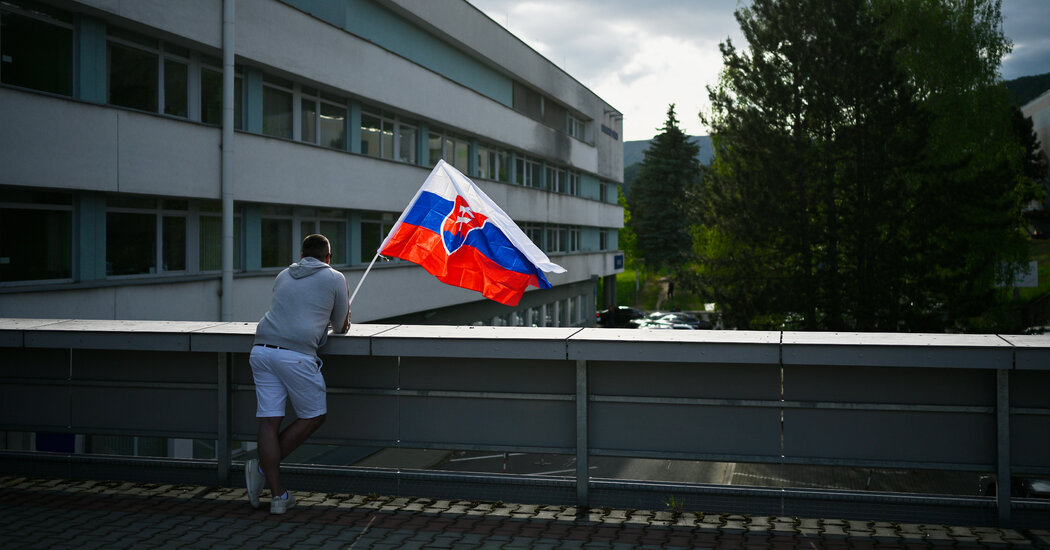“Fico was shot.” The message arrived in one of my group chats shortly after 3 p.m. on Wednesday. I checked the news and forwarded what I could find out to my friends and family. Information was limited, and headlines like “Robert Fico Was Shot After the Government Meeting in Handlova” seemed absurdly matter-of-fact.
Yes, Mr. Fico, Slovakia’s prime minister, has been a controversial figure. But could he really have been shot multiple times on a weekday afternoon in May? On Friday, he remained hospitalized in serious but stable condition after undergoing surgery.
Slovakian politics are deeply polarized in ways that have tipped into rhetorical and even physical violence. Journalist and activists, particularly women, have received online threats. In 2016 I was attacked on the way home from work. In 2022 two men were fatally shot outside a gay bar in an attack that may have been politically motivated. Last fall, two former ministers brawled at a press event.
But in large part, the hateful rhetoric — of which there is lots — is confined to the internet, and it has become normalized. Lawmakers, activists and journalists take it to be the price of participating in civic life. We reassure ourselves that those who write threatening messages online are not usually the ones who carry them out.
That’s not to say the atmosphere hasn’t had an impact on politics. Zuzana Caputova, the progressive departing president and a civil rights lawyer, has been open about the fact that death threats against her and her family helped her decide not to run again.
But someone has now shot the prime minister. In retrospect, it seems that the hateful rhetoric was gradually, inevitably building to violence, and we are waiting in this dangerous moment to see what comes next. Either the attack will trigger harsh action from the government and make everything worse. Or cooler heads will prevail, and we will pause, pick up the pieces of our fractured country and try to put them back together.
It’s hard to overstate the magnitude of the presence of Mr. Fico in Slovakian politics. A former Communist Party member and a founding member of the Smer party, which, in its early incarnation, was a party of the center-left, he has been prime minister four times since 2006. His relationship with the mainstream media started frosty and deteriorated from there. There have been frequent allegations of corruption. Anti-corruption protesters in 2016 demanded, unsuccessfully, that he and his deputy resign.
But it was the murder of the journalist Jan Kuciak and his fiancée, who were shot dead in their apartment in 2018 when Mr. Kuciak was in the middle of an investigation into political corruption, that really seemed to split Slovakian politics. Large-scale demonstrations — some with mock gallows and coffins — again demanded his departure. That time they succeeded.
Afterward, the public remained roughly divided in two camps: Those for Mr. Fico, and those against. People who were pro-Fico skewed working class and nationalist; those against were mostly members of liberal, wealthier elites.
When Mr. Fico attempted a comeback last fall, he embraced right-wing views, although his party still positions itself as social democrats, and he won handily.
The political atmosphere of the last few months has been particularly febrile. Since Mr. Fico’s return to office his coalition has embarked on a controversial bid to replace the public broadcaster, and he has dismantled an anti-corruption watchdog, despite warnings from the European Union and more protests. In April we had the presidential election — which Ms. Caputova did not run in — and Peter Pellegrini, an ally of Mr. Fico’s, won. From there we went almost directly into campaign season for the European Union elections in June.
The division seemed to harden with each election, each political rally, each campaign remark that became less and less about issues and policy and more like a Marvel-esque battle between good and evil. It came from both sides. Last year, Mr. Fico’s opponents suggested that he would turn the country over to the “mafia.” And Ms. Caputova sued Mr. Fico after he suggested she was a U.S. puppet and a supporter of George Soros.
But, until this week, most of us still thought that this was just how we do politics now.
A few hours after the shooting, video footage emerged and the online activities and opinions of the man suspected in the attack were quickly scrutinized. Everyone assumed it was political. “He must have been a progressive liberal” was one theory that circulated. The actual motives are still unclear. The interior minister described the attack as “politically motivated” but said the suspect did not belong to a “radicalized group.” He was identified only as Juraj C.
After the shooting, some lawmakers lost their tempers and continued in the usual way. “This is your fault,” the vice chairman of Smer yelled at opposition lawmakers. Another lawmaker accused journalists of being responsible, and declared the beginning of a political war. Thankfully, many other voices appealed for unity and for people to stop fueling the atmosphere of hate. Mr. Pellegrini, who won the recent presidential election, and others urged a pause in the campaigning for the European Union elections.
We know now that as we talk relentlessly about a fight between good and evil, someone, somewhere, might be taking us at our word.
Alena Krempaska is the program director at the Human Rights Institute, an advocacy organization based in Bratislava, Slovakia.
The Times is committed to publishing a diversity of letters to the editor. We’d like to hear what you think about this or any of our articles. Here are some tips. And here’s our email: letters@nytimes.com.
Follow the New York Times Opinion section on Facebook, Instagram, TikTok, WhatsApp, X and Threads.

